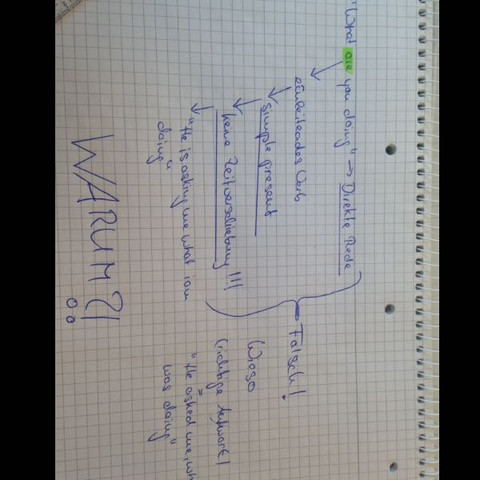Englisch Backshift Erklärung bzgl Indirekte Rede?
Hi.
Ich habe in der Schule zur Zeit das Thema (in englisch) Indirekte Rede. Im folgenden findet ihr ein Bild anhand dessen ihr mein Problem ablesen könnt. Ich verstehe einfach nicht genau, wann ich eine Zeitform zurückgegangen werden muss. Überall wird es so kompliziert erklärt. Nun hoffe ich auf die Hilfe von euch.
Mit Gruß,
Simon. :)

1 Antwort

Hallo,
steht das Verb im Einleitungssatz im Present, Present Perfect oder Future (say, tell, remark, explain ... ) ändern sich
die Zeiten nicht.
Beispiel :
She says , "I speak English". - She says that she speaks English.
Steht das Verb im Einleitungssatz im Past Tense (said, told, remarked, explained ...)
ändern sich die Zeiten wie folgt:
- aus present tense wird past tense
- aus past tense wird past perfect tense
- aus present perfect tense wird past perfect tense
- past perfect tense bleibt past perfect tense
- aus future wird conditional: would + verb
Weitere Änderungen :
- I, we, my, our zu 3. Person
- here zu there
- now zu then
- this / these zu that / those
- today zu that day
- tonight zu that night
- yesterday zu the day before
- the day before yesterday zu two days before
- tomorrow zu the next/the following day
- the day after tomorrow zu in two days’ time
- last week/month/year zu the week/mo/yr before oder the previous week/mo/yr
- a year ago zu a year before/the previous y
- next week/month/year zu the following week/m/y
Folgende Verben verändern sich normalerweise nicht :
would, should, ought to, mustn't, might, had better (lieber sollen )
could bleibt could oder was, were able to oder had been able to oder would be able to (für Zukunft)
must bleibt must oder had to would have to (für Zukunft)
If-Sätze Type II - keine Änderung der Zeiten
Beispiel : He said, 'If I were healthier, I would go skiing.' - He said that if he were
healthier, he would go skiing.
Werden Tatsachen berichtet, ändern sich die Zeiten nicht.
Beispiel : She said , 'The Seine flows through Paris.' (Tatsache, Fakt) - She said that the Seine flows through Paris.
Fragen in der indirekten Rede :
- mit Fragewörtern: when, where, why, how long, how much, who, which, what …
Das Fragewort muss in der indirekten Frage wiederholt werden.
" Why didn’t you turn off the light?“ - Mum asked why I hadn’t turned off the light.
“Where did you buy your car?” - We wanted to know where I had bought my car.
- ohne ein Fragewort muss if oder whether (ob) benutzt werden.
„Are you hungry?“ - Mother wanted to know if/whether I was hungry.
- Fragen mit shall :
Mehrere Lösungen sind möglich, je nachdem was ausgedrückt werden soll.
„Where shall we be this time tomorrow?" - Mary wondered where we/they would be that time the following day. (… wo sie
wohl sein würde(n))
„Where shall I park my car?“ - Ben wanted to know where he should park his car. (… wo er sein Auto parken sollte)
- Fragen mit will :
“Will you go by train?“ - She asked me if/whether I would go by train.
Befehle, Bitten, Aufforderungen in der indirekten Rede:
„Come to me, please.“ - She asked me to come to her. / She begged me to come to her.
“Keep away from this dog.” - He told me to keep away from that dog.
- negative Befehle
"Don't smoke, boys!” - He told the boys not to smoke.
“Don’t drink and drive!” - We were told not to drink and drive.
Die Grammatik und Übungen zur Reported Speech findest du auch im Internet, z.B. bei ego4u.de und englisch-hilfen.de .
:-) AstridDerPu

gut. Eine Sache wäre da noch.
Wenn jemand etwas sagt und ich es dolmetschen soll, kommt say (und damit kein Backshift zum Einsatz) oder said (mit Backshift) zum Einsatz ?

Der Backshift of Tense ist richtig, da es sich hier nicht um einen Imperative handelt.

Hi. Danke für die extrem hilfreiche Antwort, die ich dir auch später auszeichnen werde.
Eine Frage hätte ich trotzdem noch :)
Bei folgenden Sätzen
„Come to me, please.“ - She asked me to come to her. / She begged me to come to her.
“Keep away from this dog.” - He told me to keep away from that dog.
- negative Befehle
"Don't smoke, boys!” - He told the boys not to smoke.
“Don’t drink and drive!” - We were told not to drink and drive.
Der Einleitungssatz beginnt hier ja mit told, were told. asked, begged etc. wieso wird hier der Satzbau nicht verschoben oder verändert ?

Bei Befehlen (Imperativen) - positiven und negativen - findet, unabhängig davon, in welcher Zeit das Verb im Einleitungssatz steht, kein Backshift of Tense (keine Zeitveränderung) statt. Hier wird der Infinitive verwendet (not) to smoke (nicht) zu rauchen.
http://www.english-for-students.com/How-to-change-Imperatives-into-Indirect-Speech.html
okay, vielen dank. Ich schaue mir die Links sofort später an, da ich momentan im Bus sitze.
Aber ich versuche es einfach mal.
Folgendes:
Brother, tell, "I'm going to the cinema" (yesterday)
--> My brother told me that he was going to the cinema the day before.
(So richtig ?)